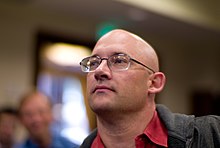Clay Shirky
Clay Shirky (born 1964[2]) is an American writer, consultant and teacher on the social and economic effects of Internet technologies and journalism.
Shirky divides his time between consulting, teaching, and writing on the social and economic effects of Internet technologies.
[6] In The Long Tail, Chris Anderson calls Shirky "a prominent thinker on the social and economic effects of Internet technologies.
[9] During this time, Shirky was vice-president of the New York chapter of the Electronic Frontier Foundation, and wrote technology guides for Ziff Davis.
He appeared as an expert witness on cyberculture in Shea v. Reno, a case cited in the U. S. Supreme Court's decision to strike down the Communications Decency Act in 1996.
In the Fall of 2010, Shirky was a visiting Morrow Lecturer at Harvard University's John F. Kennedy School of Government[10] instructing a course titled: "New Media and Public Action".
Shirky asserts that collaborative crowdsourced work results from "a successful fusion of a plausible promise, an effective tool, and an acceptable bargain with the users."
"[13] Tied to mass amateurization is the idea of publish-then-filter which is now required due to the mere size and amount of material being created on a daily basis.
In 2010 Shirky published Cognitive Surplus: Creativity and Generosity in a Connected Age which expands on themes introduced in Here Comes Everybody.
"[15] Shirky has also written about "algorithmic authority," which describes the process through which unverified information is vetted for its trustworthiness through multiple sources.
The relatively small number of high-volume contributors can be assimilated, as employees, into the old-style corporate model and thus can live in an "institution-as-enabler world".
Shirky closes by stating that the migration from institutions to self-organizing, collaborative groups will be incomplete and will not end in a utopian society.
[20] According to Audrey Tang, Shirky has coined the phrase "cognitive surplus", to describe the way that time spent on the internet can have an increasing social value.
"[22] Even countries like China, as Shirky gives as an example, go to great lengths to control information exchange on the Internet but are having trouble as the "amateurization" of media creation has effectively turned every owner of a cellphone and Twitter account into a journalist.
He compares the "Great Firewall of China" to the Maginot Line as both were built to protect from external threats but that is not where the majority of content is being created in this new media landscape.
Over the issue of the Foreign Intelligence Surveillance Act, members of the website were upset over Obama's announcement that he was changing his stance and that now he was going to sign the bill "that granted immunity for possibly warrantless spying on American persons.
[23][24][25] In June 2010, Shirky participated in TED@Cannes wherein he spoke about cognitive surplus and its role furthering communal and civic value.
Digital technology has allowed human generosity and "the world's free time and talents," which Shirky calls cognitive surplus, to combine and create a new form of creative expression.
This creative expression can take the form of lolcats or endeavors such as Ushahidi; the former Shirky says increases communal value, "it is created by the participants for each other" for simple amusement, whereas the latter he cites furthers civic value meaning the group action is taken to benefit society as a whole.
[26] Understanding where the economic or contractual motivation of a situation ends and where the social part begins, Shirky claims is key when designing to maximize generosity.
As members of a broad social community and users of media outlets, Shirky suggests ways in which we can build up this type of society.
"[30] He cites SOPA as a way for traditional, mass media producers to "raise the cost of copyright compliance to the point where people simply get out of the business of offering it as a capability to amateurs.
He identifies the Audio Home Recording Act of 1992 as a law that was able to delineate between sharing with your friends as being legal and selling for commercial gain as illegal.
Unsatisfied, media companies, Shirky claims, continued to push government to create more sweeping legislation which would hinder any form of sharing.
The DMCA marks the moment when the media industries gave up on the legal system of distinguishing between legal and illegal copying and simply tried to prevent copying through technical means.Whereas DMCA was "surgical," SOPA is "nuclear" since the law stipulates any sites pointing to "illegal" content may be censored.
[31] Shirky made the observation that many of the technological advancements in communication throughout history, from the printing press to the television, were heralded as harbingers of world peace yet ended up creating greater dissent.
